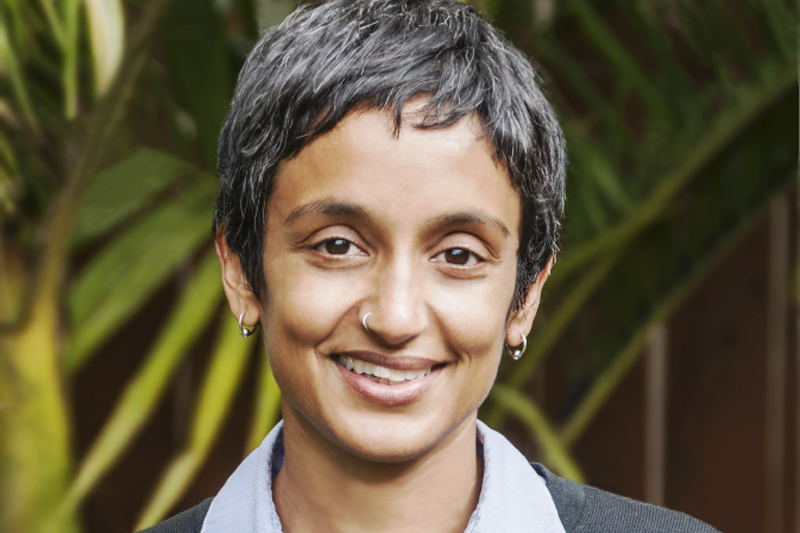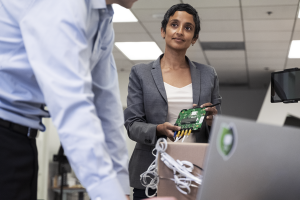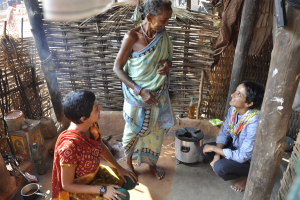Engineering Alumna and Tech Nonprofit Founder Selected 2021 TED Fellow

Nexleaf Analytics
NIthya Ramanathan
UCLA computer science alumna Nithya Ramanathan, Ph.D. ’08 has been selected as a 2021 TED Fellow for her leadership in using data and technology to improve the health of people around the world.
Ramanathan is one of only 20 new fellows representing 14 countries across five continents who were chosen for their impactful work and commitment to community building. She is Co-Founder and CEO of Nexleaf Analytics, a nonprofit technology company that utilizes data to empower decision-makers in various countries to find enduring solutions that will improve the health of people. Ramanathan started Nexleaf in 2009 with fellow computer science graduate Martin Lukac, Ph.D. ’10 from the UCLA Samueli School of Engineering.

As the pandemic ravages through communities across the globe, Nexleaf partners with a number of countries to create real-time, data-analytic tools to keep vaccines at the correct temperature and alert local staff when vaccines are in danger of becoming unusable. COVID has thwarted routine immunization efforts championed by Nexleaf across poverty-stricken countries in Africa. Gavi, the Vaccine Alliance, estimates that more than 13.5 million people willl have missed routine vaccinations for infectious diseases such as polio and measles, with millions more likely to follow. This could result in years of deadly, preventable disease outbreaks and paralyze the economic growth of the continent for years to come.
“While our work in vaccines continues to focus on partnering with countries to provide them visibility into their cold chain, we’ve shifted our priorities away from scaling technology to looking holistically at how our existing partnerships could best prepare countries for distributing the COVID vaccine while still maintaining routine immunization services,” Ramanathan said. “All of us at Nexleaf see this global focus on COVID vaccines presenting a huge opportunity to build strong and resilient systems for routine immunization that will serve generations to come.”
Science and data piqued Ramanathan’s interest early in her childhood. Born in Virginia and raised by parents who are climate and computer scientists, Ramanathan spent her primitive years bouncing around the U.S. with her family — from San Francisco to Chicago before settling in Los Angeles. She said the experience helped make her adaptable. Her family has deep roots in the University of California system. All three of her siblings attended University of California schools, and her father, brothers and one sister-in-law are faculty members at UC San Diego.
After getting her bachelor’s in electrical engineering from UC Berkeley, Ramanathan initially worked at HP and Intel as a hardware engineer but soon realized that was not her calling. She knew she enjoyed designing solutions for complex problems and was ready for the next challenge. Ramanathan was swept away at a tech talk by computer researcher and technology executive David Tennenhouse on distributed sensing (the precursor to what is now known as Internet of Things or IoT). The event was hosted by then UCLA professor Deborah Estrin, and it inspired Ramanathan to pursue her doctoral degree in computer science and work in Estrin’s lab.
“The research I did, the people I got to work with, the interdisciplinary study and the creative risks that I had the opportunity to participate in at the NSF Center for Embedded Network Sensing that Deborah launched at UCLA will forever remain some of my most profound learning experiences,” Ramanathan said.

partners in India.
The busy academic schedule did not stop Ramanathan from learning how to make sensor networks work in real life. In fact, Ramanathan recalled being one of the few computer science students who spent as much time studying as working in the field. In her case, it meant being knee-deep in mud in a rice paddy in Bangladesh or in a forest at the James San Jacinto Mountains Reserve — a unit of the University of California Natural Reserve System.
“I was fortunate to spend time in Bangladesh for my thesis, which focused on arsenic poisoning in groundwater,” Ramanathan said. “I ended up connecting closely with the people living in the village where I was conducting my study, but felt troubled that they looked to me as a hero despite the fact I was there simply to conduct my thesis.”
Before she left Bangladesh, Ramanathan successfully led fundraising efforts to build the village a new well, but the experience left her wanting to do something more meaningful.
“As I reflected on the achievement on my plane ride back home, I realized that in reality, it was a failed effort,” Ramanathan said. “What happens when the well inevitably breaks? Who would fix it? Where would they get the spare parts? Without a system in place to sustain the well, it would ultimately fall into disrepair and leave the community once again exposed to unsafe drinking water.”
That experience became a watershed moment for Ramanathan and sparked her passion for creating long-term, sustainable solutions. To Ramanathan, the idea of “tech-for-good” means designing and developing technology that can benefit communities that have historically been denied access to innovation. She wanted to create long-term, sustainable solutions backed up by good data, and that conviction eventually drove her to set up her own company Nexleaf.
“Too often, technology is seen as the end goal, rather than a means to an end,” Ramanathan cautioned.
“Too often, technology is seen as the end goal, rather than a means to an end,” Ramanathan cautioned. “Most of the time in global health, technology — not to mention sub-par technology — is built and shipped to a low-resource environment without thinking about the ecosystem that it needs to operate in. Without training, technicians, spare parts, or the local financing to keep these technology solutions working, these efforts are wasted and lead to donated equipment sitting idle in equipment graveyards around the world.”
For Ramanathan, it is more important to focus on developing an interoperable data platform that can help identify and scale solutions to build resiliency and reliability into global health systems. Nexleaf works closely with partners in different countries to develop lasting solutions they can manage on their own.
The company’s life-saving technology has attracted support from a number of high-profile tech and health care giants such as Google, the Bill & Melinda Gates Foundation, Gavi, global ministries of health and other non-governmental organizations.
To fellow Bruins pursuing a career in STEM and entrepreneurship, Ramanathan says grit is the true key to success instead of mere creativity and vision. “Grit is what gets you to grow, scale, and ultimately, make an impact. I have failed in every possible way but perseverance is what has brought me to where I am,” Ramanathan explained.
In addition, she suggests that regardless of one’s career path, it is important to identify an internal north star — a clear sense of an inner compass — in order to guide important decisions along the way. Finally, Ramanathan recommends prioritizing equity and quality of life in one’s entrepreneurial endeavors.
“This commitment has led me to fight for countries’ rights to own their data, even if it went against the commercial interests of the organization in the short term,” Ramanathan said. “Because in the long term, that’s the only way to drive real change and achieve equity across the global health system.”
